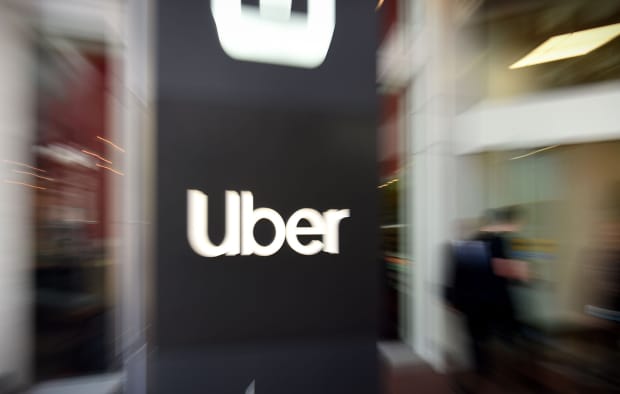This post was originally published on this site

Uber reported third-quarter earnings Thursday.
AFP/Getty Images
Fresh off its election victory to avoid classifying drivers as employees in California, Uber Technologies Inc. reported Thursday that its business continued to recover from a pandemic-induced slowdown.
Third-quarter gross bookings were down only 6% from the year-ago period as pandemic-related lockdowns eased and some people went back to work and travel, though Uber’s UBER, +2.36% delivery business continued to outperform its rides business, which was down 50% year over year but double that of the previous quarter. Uber Eats bookings climbed 135% from the same period a year ago.
“All early evidence makes it increasingly clear that it’s a matter of when, not if, our rides business will recover,” Chief Executive Dara Khosrowshahi said on the company’s earnings call, although he noted that the performance of the segment continues to be correlated with lockdowns. For example, he said the company has seen a slight contraction in rides in the Europe, the Middle East and Africa region in the past month as COVID-19 cases rise in some countries there.
As for the $200 million-plus ballot measure approved by 58% of California voters this week, on which the company spent more than $58 million, “I’m happy to say Prop. 22 passed with a healthy margin,” Khosrowshahi said on the call. “This matter is now settled in the most populous state in country. We feel strongly that this is the right approach.”
The CEO said his San Francisco-based company would now advocate for similar laws elsewhere in the nation and the world, adding that he believes there is broad support for what he called the IC (independent contractor)-plus model among drivers and the public.
Chief Financial Officer Nelson Chai said on the call that the costs of providing possible increases in wages and health care subsidies to drivers, as promised by the proposition, will be “manageable.”
More on Prop. 22: Uber and Lyft win fight to keep drivers as contractors instead of employees in California
Uber narrowed its third-quarter loss to a little over $1 billion, or 62 cents a share, compared with a loss of nearly $1.2 billion, or 68 cents a share, in the year-ago period. Analysts surveyed by FactSet on average expected Uber to post a loss of 60 cents a share, or $1 billion, compared with the company’s nearly $1.2 billion loss in the year-ago period. They expected an adjusted loss of 50 cents a share.
Revenue fell to $3.13 billion, compared with $3.8 billion in the year-ago quarter. Analysts on average expected revenue of $3.07 billion, according to FactSet.
Uber’s executives had nothing but optimism about its delivery business, which brought in revenue of $1.45 billion, a 125% year-over-year increase, and how it gives the company an edge over its competition when combined with its rides unit.
“Delivery is benefiting from a massive shift in consumer behavior,” Khosrowshahi said. “People aren’t going to stop using Amazon. They’re not going to stop using Uber Eats. We’re one of a few companies that can take advantage of this.”
He also mentioned that there is plenty of room for growth in delivery, saying that in some markets Uber has only signed up 10% to 20% of restaurant partners. The company is also doubling down on delivery of groceries and launched prescription-delivery pilots in Dallas and Seattle.
As for the rebound in rides, Uber’s CEO said the company is seeing an advantage as riders in some markets are choosing ride-hailing instead of public transportation or even taxis. Revenue from Uber’s mobility business was $1.37 billion, down 53% year over year.
Shares bounced between gains and losses in after-hours trading after closing the day up 2.3% at $41.96. Uber shares have risen 41% so far this year.

